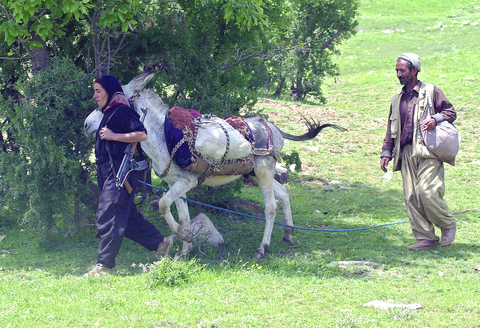Hundreds of Kurds had to flee their homes in the mountain village of Razqa, Iraq, when artillery shells came whistling down from Iran early this month, blowing apart their homes and livestock.
In Turkey, meanwhile, armored personnel carriers and tanks rumble along its remote border with Iraq's Kurdish zone. Turkey has sent tens of thousands of fresh soldiers in the last few weeks to beef up an already formidable force there.
The Kurdish provinces of northern Iraq are the country's most stable and prosperous area. But to neighboring Iran and Turkey, both with large Kurdish minorities, they are something else: an inspiration and a support base for the Kurdish militants in their own countries.

PHOTO: AP
So Iran and Turkey are sending troops, tanks and artillery to the frontier to seal off the borders and send a message: If the US-backed Iraqi government doesn't clamp down on Kurdish guerrillas who use Iraq as a base, they could do it themselves.
That has left the US in a quandary. If US forces take action, they risk alienating Iraqi Kurds, the most pro-US group in the region. And if they don't, they risk increased tensions -- and possibly worse -- with two powerful rivals.
Just listen to Turkish Foreign Minister Abdullah Gul.
"We would not hesitate to take every kind of measures when our security is at stake," Gul said when asked whether Turkish troops might cross into Iraq. "The United States best understands Turkey's position. Everybody knows what they can do when they feel their security is threatened."
Iran's artillery barrages could be warning shots, a crackdown on Kurdish guerrillas now is a factor in the wrangling with the US over Tehran's nuclear program.
Kurds, who make up 14 percent of Iran's population, have long complained of discrimination in Iran. Iraq's Kurds backed the US invasion of their country. Would the Kurds of Iran take the US side if tensions escalated there?
"The Iranians are clearly very concerned over the mobilization of their own Kurdish minority," said Toby Dodge, an Iraq expert at Queen Mary College, University of London.
And Tehran may also be flexing its muscles to remind Washington that it shares a long border with Iraq, and could cause serious problems there for the US.
The Iranians' policy is to warn that "we have the potential to run you out of Iraq if you don't give us some slack over the nuclear issue," Dodge said.
The traditional Kurdish region spans Iran, Iraq, Turkey and Syria and the guerrillas are based in a mountain range of northern Iraq that stretches into Turkey and Syria. They seem determined to keep up their decades-long struggle.
Kurdish guerrillas of the Party of Free Life of Kurdistan, or PEJAK, have called on Kurds in western Iran to begin a campaign of civil disobedience. In clashes with Iranian security forces last year, dozens of PEJAK fighters and about a dozen Iranian soldiers were killed, according to official Iranian reports.
This year, more than a dozen members of Turkish security forces in southern Turkey have been killed fighting Kurdish guerrillas of the Kurdistan Workers Party, or PKK, which is closely allied with PEJAK.
After Iran shelled a village used by Kurdish guerrillas, the PKK warned that it was "capable of responding to these attacks with more strength then ever."

Indonesia and Malaysia have become the first countries to block Grok, the artificial intelligence (AI) chatbot developed by Elon Musk’s xAI, after authorities said it was being misused to generate sexually explicit and nonconsensual images. The moves reflect growing global concern over generative AI tools that can produce realistic images, sound and text, while existing safeguards fail to prevent their abuse. The Grok chatbot, which is accessed through Musk’s social media platform X, has been criticized for generating manipulated images, including depictions of women in bikinis or sexually explicit poses, as well as images involving children. Regulators in the two Southeast Asian

COMMUNIST ALIGNMENT: To Lam wants to combine party chief and state presidency roles, with the decision resting on the election of 200 new party delegates next week Communist Party of Vietnam General Secretary To Lam is seeking to combine his party role with the state presidency, officials said, in a move that would align Vietnam’s political structure more closely to China’s, where President Xi Jinping (習近平) heads the party and state. Next week about 1,600 delegates are to gather in Hanoi to commence a week-long communist party congress, held every five years to select new leaders and set policy goals for the single-party state. Lam, 68, bade for both top positions at a party meeting last month, seeking initial party approval ahead of the congress, three people briefed by

The Chinese Embassy in Manila yesterday said it has filed a diplomatic protest against a Philippine Coast Guard spokesman over a social media post that included cartoonish images of Chinese President Xi Jinping (習近平). Philippine Coast Guard spokesman Jay Tarriela and an embassy official had been trading barbs since last week over issues concerning the disputed South China Sea. The crucial waterway, which Beijing claims historic rights to despite an international ruling that its assertion has no legal basis, has been the site of repeated clashes between Chinese and Philippine vessels. Tarriela’s Facebook post on Wednesday included a photo of him giving a

Yemen’s separatist leader has vowed to keep working for an independent state in the country’s south, in his first social media post since he disappeared earlier this month after his group briefly seized swathes of territory. Aidarous al-Zubaidi’s United Arab Emirates (UAE)-backed Southern Transitional Council (STC) forces last month captured two Yemeni provinces in an offensive that was rolled back by Saudi strikes and Riyadh’s allied forces on the ground. Al-Zubaidi then disappeared after he failed to board a flight to Riyadh for talks earlier this month, with Saudi Arabia accusing him of fleeing to Abu Dhabi, while supporters insisted he was